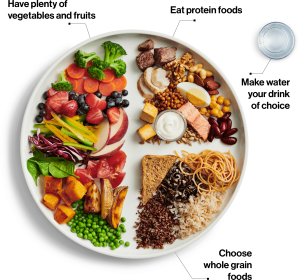Are You Confused About the Canada Food Guide and Celiac Disease?
Are you confused about the new Canada Food Guide in regard to celiac disease? As a dietitian specializing in celiac disease, Selena De Vries highlights the parts of the food guide that we should pay attention to.

- Selena De Vries is dedicated to helping individuals who are struggling with digestive issues find food freedom. Selena understands that celiac disease not only effects one’s physical health but also effects one’s emotional health. Using an integrative approach in the management of digestive health conditions, she provides support for those with celiac disease/gluten sensitivity and nutrition coaching for other digestive health conditions.
Get Selena’s Gluten-Free Food Guide!
***********
 The new Canadian Food Guide was released and it is quite a drastic change from the old 2007 edition. Overall, it’s a very welcomed step in the right direction.
The new Canadian Food Guide was released and it is quite a drastic change from the old 2007 edition. Overall, it’s a very welcomed step in the right direction.
The first thing to emphasize is that this a population health guide. It’s a guide that states a general pattern of healthy eating that is consistent with a reduced risk of chronic disease. It is not meant to provide specific nutrition advice for individual circumstances. More on that below.
One of my favorite reasons I like this guide is it promotes HOW to eat vs WHAT to eat. Many people have the knowledge of what is healthy, but have a hard time putting that knowledge into action. And the “how to eat,” outlines some very actionable and important steps to consider when eating food.
If you do have a health condition, such as celiac disease, then you should see a dietitian to individualize the guide to your needs. So, as a dietitian specializing in celiac disease, let’s highlight parts of the food guide that someone with celiac disease should pay attention to.
1. Set your plate up like the plate model graphic:
One of the big changes of the food guide is the removal of food groups and serving sizes. This has been replaced by a more abstract plate model encouraging Canadians to consume 1/2 of their meal as fruits or vegetables, 1/4 whole grains and 1/4 protein. This can present a few challenges for someone with celiac disease, especially including enough bone health nutrients, which I talk more about below.
However, someone with celiac disease, should try to set their plate up as the graphic shows on the Canada food guide because this will help address the fiber gap that many celiacs struggle with. In fact, lack of fiber is one of the most common nutrients of concern.
By filling your plate or bowl with half fruit and vegetables, 1/4 with protein and 1/4 with gluten free whole grains, you will be more likely to hit the fiber target each day, which is 25g for adult women and 38g for adult men.
2. Focus on calcium and vitamin D rich source of foods
The removal of foods groups, such as ‘milk and alternatives’, is a big change to this food guide. There is now less emphasis on milk and alternatives as they have been combined with the new ‘protein’ group which includes milk products, milk alternative products, nuts and seeds, beans and legumes, fish, egg, tofu, poultry and lean red meat. Instead of a whole group of foods showcasing milk and alternative products, there is now only one pot of yogurt in the protein group.
This may present challenges for those with celiac disease as calcium and vitamin D are two other nutrients of concern on a gluten free diet. Celiac disease comes along with an increased risk of developing osteoporosis so it’s important to pay attention to bone health nutrition everyday. Special attention to including daily dietary sources of bone health nutrients, especially calcium and vitamin D, is definitely needed.
Again, let’s pay attention to the plate:
For fruits and vegetables, choose these often: mushrooms, artichokes, beet greens, bok choy, broccoli, collard greens, dandelion greens, edamame, figs, grapefruit, cooked kale, turnip greens or mustard greens, kiwi, okra, orange, rutabage, seaweed, snap peas, snow peas, butternut squash
For protein foods, aim to include a variety daily: fortified plant milks, almonds, cow/goat/buffalo milk, yogurt or cheese, kefir, chickpeas, navy beans, great northern beans, pinto beans, soybeans, white beans, hummus, almonds, canned salmon with bones, sardines, shrimp, cod, tofu set with calcium sulfate
Depending on your unique circumstances, you may also need a calcium supplement, which should be discussed with your knowledgeable doctor or dietitian.
Most individuals with celiac disease (and, really all Canadians), will most likely need a Vitamin D supplement. Depending on your levels, your dietitian or doctor can individualize a supplement regime for you. A good starting dose is 2000IU taken once per day with food.
Interested to know how much daily calcium you consume and if you are meeting your unique need? You can take this fun quiz .
3. Focus on B Vitamin Rich Sources of Food
The previous food guide version had recommendations for women of child bearing years to ensure adequate folate (vitamin B9) intake. In the new guide, there is no emphasis on adequate folate.
This, again, may be problematic for those with celiac disease because lack of B vitamins, including folate, B12, B6, thiamine, riboflavin and niacin, are additional nutrients of concern for celiacs.
Although a folate deficiency anemia is not as common as iron or B12 anemias in individuals with celiac disease, it may be a good idea to ensure adequate folate intake through a general multivitamin, especially if you are of childbearing years. Ask your dietitian or doctor.
Again, let’s pay attention to the plate:
For fruits and vegetables: include a variety of green peas, mushrooms, cooked spinach, avocado, broccoli, turnip greens, collard greens, beets, asparagus, brussel spouts, artichoke, papaya.
For proteins: Edamame, lentils, beans, lean beef, eggs, fish, poultry, tofu, nuts and seeds
Here’s the bottom line for the gluten free diet and the new Canadian food guide:
- Eat enough fiber by ensuring that whatever you eat (whether out of a bowl or a plate) is half fruits and vegetables.
- Eat more plant based foods including nuts, seeds, beans, legumes and tofu as these are high in fiber and can be a good source of calcium.
- Choose green foods everyday, as they are a good folate source as well as calcium.
- Consume enough bone health rich foods, including calcium and vitamin D. Work with a dietitian to optimize your diet and to identify if you need a supplement, especially if you do not consume dairy. Or take the quiz above for a starting point.
- Include a variety of foods from each category of the plate. Make it a goal to buy one new or rarely eaten fruit or vegetable when grocery shopping.
- Consider taking a high quality, general multivitamin with folate. Especially, if newly diagnosed.
Read Selena’s Original Article Here!
Listen to Selena explain the Guide on ‘A Canadian Celiac Podcast’ here!
 Selena De Vries is a Registered Dietitian living with celiac disease who specializes in the dietary management of that condition. She will be hosting a ‘virtual office hour’ on the Canadian Celiac Association Facebook Group every Friday from 12 – 1pm Pacific Standard Time (3pm – 4pm Eastern Standard Time). Selena will post at 12pm stating she is online. Ask your nutrition related questions in the comment section within her post. Arrive early and post your question!
Selena De Vries is a Registered Dietitian living with celiac disease who specializes in the dietary management of that condition. She will be hosting a ‘virtual office hour’ on the Canadian Celiac Association Facebook Group every Friday from 12 – 1pm Pacific Standard Time (3pm – 4pm Eastern Standard Time). Selena will post at 12pm stating she is online. Ask your nutrition related questions in the comment section within her post. Arrive early and post your question!
Selena is licensed to practice as a dietitian in British Columbia and her services are available to anyone in Canada.
Living in the Okanagan or anywhere in British Columbia? View Selena’s services or book an appointment!
- Contact Selena for in-person or on-line support
- HealthBean.ca • Facebook • Twitter • Instagram • Pinterest • Videos • Blog
- [email protected] • 1-778-990-6047
Celiac Total Health Package – 5 sessions
- Includes one initial assessment, 3 follow ups and a meal planning assessment along with a one week meal plan. Selena will recommend labs/procedure to identify any underlying nutrient deficiencies, will provide you with all the education you need to feel confident going gluten free and get you feeling better throughout our appointments, and most importantly, help you prepare and choose healthy GF products and get healthy GF meals on the table that the whole family can enjoy. Book your appointment or contact Selena with questions.
Eating Out With Confidence – 3 sessions
- Are you avoiding eating out due to the fear of being ‘glutened?” If so, this package is for you. Selena will provide you with education and resources that will improve your confidence in eating out safely. You will also get access to her on the go! For example, if you are eating out at a restaurant and need help in ordering your meal to reduce risk of being contaminated, she will walk you through what you need to ask to ensure your meal is at low risk of being contaminated. Book your appointment or contact Selena with questions.
Meal Planning Initial Assessment – 1 hour In-person – Online, video chat or by phone
- If you are struggling with getting healthy meals on the table that everyone can eat, this is for you. Selena will conduct a meal planning assessment and based on your input, she will put together a sample one week meal plan along with brand name food recommendations. You will get recommendations that makes healthy eating (with food restrictions), convenient, healthy and delicious. Book your appointment or contact Selena with questions.
Celiac Initial Consultation – 1 hour 30 minutes In-person, online, video chat or by phone
- Please book if you have been newly diagnosed with celiac disease or if you have celiac disease but are still struggling with symptoms. Selena will conduct a nutrition assessment & will provide an emailed lifestyle plan within 24 hours detailing the nutrition plan going forward. Supplements and lab tests will be recommended on an individual basis and the lifestyle plan will also include educational handouts, recipe ideas, and brand name food recommendations. Allow a minimum of 3 days advance booking as a 3 day food journal is required prior to the appointment. Book your appointment or contact Selena with questions.
Celiac Dietitian on Demand – 30 minutes – Online, video chat or by phone
- This is not for newly diagnosed celiacs or those who are struggling with digestive symptoms. If this is you, please book the initial consult (either celiac or digestive health). This is for you if your symptoms are fairly under control and you have brief questions. For example, a question on supplement use, the inclusion of GF oats in the diet, if you are grocery shopping and want to confirm if a brand name product is gluten free and safe to consume, if you are at a restaurant and want to know how to order an item that will be at low risk for being contaminated, or if you have questions on GF travel. Book your appointment or contact Selena with questions.
Initial Digestive Health Consult – 1 hour 15 minutes – In-person, online, video chat or by phone
- Please book if you are struggling with digestive health concerns or have been diagnosed with a digestive health condition (if you have been diagnosed with celiac, please book the celiac specific consult). Selena will conduct a nutrition assessment & will provide an emailed lifestyle plan within 24 hours detailing the nutrition plan going forward. Supplement, lab tests and lifestyle recommendations will be recommended on an individual basis and the lifestyle plan will also include educational handouts, recipe ideas, and brand name food recommendations. Allow a minimum of 3 days advance booking as a 3 day food journal is required prior to the appointment. Book your appointment or contact Selena with questions.
45 Minute Follow Up Appointment – In-person, online, video chat or by phone
This service can only be booked after an initial consultation has been completed. We will identify how the individual is doing on goals, barriers they may be facing, and steps to take going forward. Book your appointment or contact Selena with questions.
Testimonial
- “I contacted Selena when I still wasn’t feeling well a year after my celiac diagnosis. I’d read so much on the Internet I thought I knew everything I needed to know. I was wrong.
- Selena has important advice on how to do GF properly (it’s not as straightforward as I thought) and for regaining your health. She is organized, punctual, and professional. And she has celiac disease herself , so she gets it.
- I think a lot of us, by the time we’re diagnosed, have had more than our share of health care practitioners and may not want to bother with a dietitian.
- Selena played a crucial role in my recovery, and I would highly recommend her, whether you’re newly diagnosed or just trying to feel better.”
- ~ Charlene (long-distance celiac disease client)
- HEALTHBEAN NUTRITION specializes in digestive health. We deliver easy to digest, bite-size pieces of information so our clients can, finally, achieve the healthy & happy digestive system they’ve been striving for. Learn more ...
- HEALTHBEAN PHILOSOPHY– Selena employs elimination diets and/or a specific diets in accordance with her clients’ conditions, and only when deemed necessary. She reserves advice about the gluten-free diet for those who require it – not those choosing to follow the diet as a lifestyle choice. Expect clear, concise instructions on the appropriate diet for you and, maybe even some myth busting! Learn more …
Selena knows first-hand how her undiagnosed celiac disease affected her physical and emotional health. After telling her that, “Well, you have celiac disease,” her MD suggested she, “google the diet,” and out the door she went. Sound familiar?
That’s why Selena established Healthbean Nutrition. She is dedicating her education, personal insights and her own recovery to helping her fellow celiacs make this enormous lifestyle transition – and find joy in eating again! Learn more …
Selena’s Road to Diagnosis
- “When I was going through university, I was exhausted, ALL the time. I had to drag myself out to hang out with friends, and if I had it my way I would have spent most days in bed sleeping. It was not unknown for me to sleep 12-16 hours a day. Call me crazy, but I related it all to the busy-ness of school. I was even checked for anemia at one point (common with celiacs) and I was ‘fine.’
- The symptoms continued through school and the brain fog was undeniable. I distinctly remember during my dietetic internship (like a medical residency except everything is nutrition based) at Kelowna General Hospital sitting in the office, charting on a patient and, literally, feeling like my brain was so fuzzy that I could barely keep my eyes from nodding off. It was awful.
- Another thing I didn’t pay much attention to, was bowels. I was always constipated. Never the other way around. Never. And, I also remember mentioning this to my gastroenterologist just before the endoscopy and he said ‘oh, well with your very low antibody levels and constipation, there is a very low chance that you are actually celiac but we will proceed with the endoscopy since you’re prepped and ready to go.’
- The piece of paper I received after the endoscopy said to follow up with my GP. I did follow up with my GP and the report came back positive for celiac disease. My GP said “well, you’re celiac. But, you’re a dietitian, right, so this should be easy for you!”
- Perhaps I had a leg up in the nutrition part of it, but I think we all know that the gluten free diet is not a walk in the park. And, although, I am so appreciative of the medical care I received, it did open my eyes to the lack of knowledge within the medical community when it came to celiac disease and the lack of support offered to individuals with celiac disease.
That’s how Healthbean Nutrition was born!
Leave a comment at the bottom of the page.
- *Information and perspectives posted on The Celiac Scene are intended to provide general information, without independent verification on the part of The Celiac Scene for the accuracy of the information provided to it. The information is specifically not intended to be a substitute for medical diagnosis or treatment by your physician or other health care professional. Always consult your own physician or other health care professionals about any medical questions, diagnosis, or treatment, especially before trying any diet. Healthbean Nutrition does not accept any liability for any injury, loss or damage incurred by use of or reliance on any content contained herein.
















